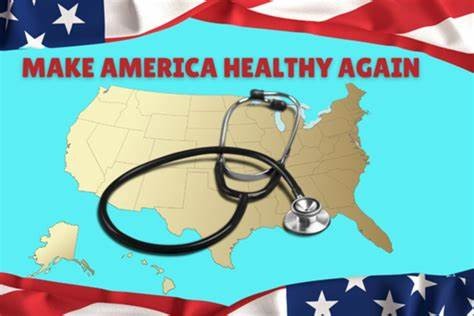
24 May Make America Healthy Again
“Will the Trump Administration’s MAHA policies make America healthier?” – The Lonely Realist
In a May 12th Executive Order, President Trump directed drugmakers to reprice their medicines to align their U.S. prices with the prices charged in other countries. His stated goal is to create a “most favored nations” (MFN) framework. “Everybody should equalize. Everybody should pay the same price.” MFN drug pricing is a bipartisan policy. It has been embraced by President Trump, advocated by Senator Bernie Sanders, and was a part of the Inflation Reduction Act’s Medicare drug mandate. Senator Sanders has cautioned, however, that President Trump’s Executive Order requires Congress to pass confirmatory legislation: “As Trump well knows, his executive order will be thrown out by the courts. If Trump is serious about making real change rather than just issuing a press release, he will support [my co-sponsored End Price Gouging for Medications Act].”
The choice, however, should not be between Federal government control of drug prices by Executive Order or by legislative act. The question should be whether the Federal government ought to be in the business of controlling prices at all. Powerful public policy reasons would be necessary to justify both Federal government dictation of private sector prices and the costs of government regulatory oversight. Although beneficial for American consumers, price controls are Statist, antithetical to free-market capitalism. Specific to drug price control, economists are concerned that the Trump 2.0 mandate could “lead to a reduction in patient access to certain drugs, less investment in the research and development of new drugs, and cost-shifting that raises the prices of other therapeutics,” concluding that “patients will suffer as cures are delayed or entirely undeveloped….” Critics have pointed out that MFN pricing could be gamed by pharmaceutical companies to create “the appearance of higher prices overseas by agreeing to confidential rebates — already common overseas — that produce the same old low net prices.” Whether or not Trump 2.0 advances the MFN initiative, Senator Sanders is correct that the courts are likely to prevent the U.S. Department of Health and Human Services (HHS) from executing on the Executive Order without supporting legislation. Because the President and Congress are in apparent agreement, however, legislation supporting MFN drug price controls should move forward.
Assuming that this happens, budget cuts and regulatory shrinkage could hamper successful implementation. For example, DOGE has ordered a 35% cut to funding for the National Institute of Health (NIH) and the Trump 2.0 budget seeks to increase that cut to 40% as well as to cut 44% from the budget of the Centers for Disease Control and Prevention (CDC). Funding reductions will impact policy execution as well as scientific and biomedical innovation, cancer research, infectious disease prevention, and mental health. On the one hand, the Trump Administration is seeking to expand the regulatory state by mandating drug price controls and other Federal initiatives, and on the other it is slashing budgets and excising regulations in an effort to reduce Federal government participation in and funding of the healthcare sector.
This bipolarity is reflected in the policy positions of HHS Secretary Robert F. Kennedy, Jr., whose appointment faced significant opposition. Similarly controversial healthcare appointments by President Trump include Dr. Casey Means as Surgeon General (her background is as a health care entrepreneur and social media influencer; per Dr. Means: “Health is the tip of the iceberg of fundamentally, like, a planetary issue but, like, the planetary issue is the tip of the iceberg of what I think is really really going on here which is, like, a spiritual issue, [meaning that] are we committed to life and to awe and to connecting with source, and then listening?”), Martin Makary as Commissioner of the FDA (he is a critic of the FDA who opposes vaccine mandates and other public health measures), and Jay Bhattacharya as the Director of the NIH. Those appointments are consistent with Secretary Kennedy’s goals of reducing/eliminating vaccine mandates, effecting sizable staff reductions (at the CDC, FDA, NIH, and elsewhere), cutting funding for State and local public health programs, and advancing Federal support for alternative and holistic therapies and imposing restrictions on food additives. Among Secretary Kennedy’s first acts was to force the resignation of Dr. Peter Marks, the leading FDA vaccine official (per Dr. Marks: “It has become clear that truth and transparency are not desired by the secretary, but rather he wishes subservient confirmation of his misinformation and lies.”).
Secretary Kennedy has been a leading opponent of vaccinations. It therefore is no surprise that he forced out Dr. Marks and hired Vinay Prasad, a prominent anti-vaxxer, to be the Director of the Center for Biologics Evaluation and Research and assigned him to lead a study questioning the science behind the measles, mumps and rubella (MMR) vaccine. The MMR vaccine is mandated in 49 of America’s 50 States and, over the last 60+ years, has proven itself to be 97% effective in protecting children against the highly contagious measles infection. In order to achieve “herd immunity” (which stops the spread of a disease), 95% of a population needs to be vaccinated. From 2013 to 2023, the median U.S. MMR vaccination rate fell from 95% to 92% (with Idaho, the only State that does not mandate the MMR vaccine, below 80%). Medical specialists have warned that measles may be “the canary in the coal mine for other vaccine-preventable diseases that are going to start to rear their ugly heads in the next few months, next few years, if our vaccine rates continue to drop.” Secretary Kennedy believes that they should drop. He has directed America’s health agencies to explore potential new treatments for measles, including vitamins and cod liver oil. The CDC under Secretary Kennedy also no longer is recommending water fluoridation and the Environmental Protection Agency under Secretary Lee Zeldin is rescinding limits on four PFAS “forever chemicals” in drinking water – PFAS chemicals have been linked to a number of serious illnesses. Commissioner Makary and Director Prasad this past week unveiled a nuanced COVID vaccination policy (consistent with the views previously expressed by Director Bhattacharya) that no longer recommends booster shots for healthy Americans ages 64 and younger. Also this week, a report from the President’s MAHA Commission described factors (including diet, environmental toxins, insufficient physical activity, chronic stress, and overmedicalization) that the Trump Administration will address as the “root causes” of childhood obesity, diabetes, autism, attention deficit hyperactivity, etc.
Secretary Kennedy and his colleagues in their first few months have dramatically reshaped the U.S. health apparatus, eliminating agency divisions and shifting policy priorities. Time will tell whether those changes indeed Make America Healthier.
Finally (from a good friend)





Steve
Posted at 06:38h, 25 MayThanks for this one. I think the exposure of the health related issues across the board deserves the scrutiny. Appreciate how you understand the danger while ending the article by wondering something you know the answer too.
Once again an issue that created fear for my grandkids!
Thanks
Steve